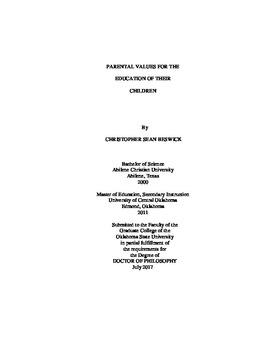| dc.contributor.advisor | Montgomery, Diane | |
| dc.contributor.author | Beswick, Christopher Sean | |
| dc.date.accessioned | 2018-04-23T19:36:34Z | |
| dc.date.available | 2018-04-23T19:36:34Z | |
| dc.date.issued | 2017-07 | |
| dc.identifier.uri | https://hdl.handle.net/11244/299559 | |
| dc.description.abstract | While broad attempts have been made to investigate values undergirding school choice (Bosetti & Pyryt, 2007; Zeehandelaar & Northern, 2013), research has yet to employ a means for subjectively and holistically investigating parents' values for the education of their children across multiple school contexts. Q methodology was used with 29 parent participants who rank-ordered 40 statements aligned with the four-quadrant model of human development and holistic education: cognitive, social and emotional, psychomotor, and intuition and creative. Results yielded a three-factor solution interpreted along with interview data and field notes to be Reverence in Tradition, Diversity in Experiences, and Morality in Decisions. Reverence in Tradition reflects a priority of spiritual development. Diversity in Experiences emphasizes autonomous student growth through diverse interactions and ideas. Morality in Decisions emphasizes respectful and positive interaction with others. Three conclusions emerge from this research: there are three ways that parents who enroll their children in public, private, or homeschools express the priorities for the educational needs of their children; a four-quadrant model of education assists in understanding parents' subjective views related to the educational needs of their children; and school setting serves as an interesting role in understanding priorities for the developmental needs of children. Of interest is the finding that all three academic contexts were represented in each of the three viewpoints; however, some parents may place children in school contexts that align with preferences, such as most Reverence in Tradition were home or private schools, the other two parent groups favor public schools. Findings from this research can assist policymakers, administrators, and teachers who want to understand parents' values for the education of their children. | |
| dc.format | application/pdf | |
| dc.language | en_US | |
| dc.rights | Copyright is held by the author who has granted the Oklahoma State University Library the non-exclusive right to share this material in its institutional repository. Contact Digital Library Services at lib-dls@okstate.edu or 405-744-9161 for the permission policy on the use, reproduction or distribution of this material. | |
| dc.title | Parental values for the education of their children | |
| dc.contributor.committeeMember | Vogler, Jane | |
| dc.contributor.committeeMember | Henry, Carolyn | |
| dc.contributor.committeeMember | Jacobs, Sue C. | |
| osu.filename | Beswick_okstate_0664D_15347.pdf | |
| osu.accesstype | Open Access | |
| dc.type.genre | Dissertation | |
| dc.type.material | Text | |
| thesis.degree.discipline | Educational Psychology | |
| thesis.degree.grantor | Oklahoma State University | |
